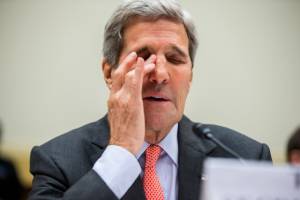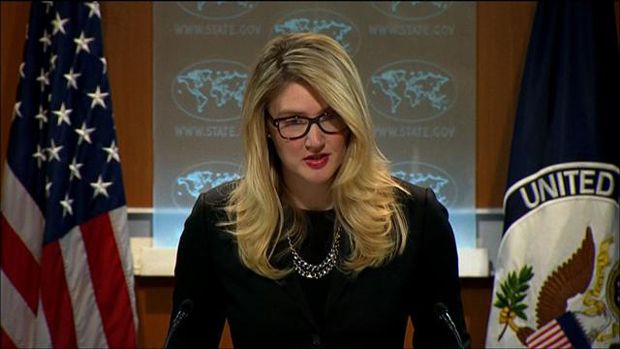
Secretary of State John Kerry (AP/Andrew Harnik)
A misleading column in the Washington Post, boosted by the Obama administration, claims that four Israeli security experts believe the Iran nuclear deal is a good one. In fact, none of them do.
Both supporters and opponents of the nuclear accord with the Islamic Republic have been vigorously lobbying for support through meetings, rallies and the media. Both sides underscore the points they deem significant to the discussion.
According to a report by the Committee for Accuracy in Middle East Reporting in America (CAMERA), a media-monitoring, research and membership organization devoted to promoting accurate and balanced coverage of Israel and the Middle East, some have resorted to less professional forms of persuasion.
Secretary of State John Kerry’s senior adviser, for instance, reportedly misled her boss and thousands of others last week in alleging top-level Israeli support for the Iran agreement.
Marie Harf, Kerry’s senior adviser for Strategic Communications, on Thursday shared on Twitter a seemingly distorted Washington Post headline claiming that Israelis in the know are in favor of the deal.
She tweeted the headline, “How the Iran deal is good for Israel, according to Israelis who know what they’re talking about,” adding a link to the piece.
The article names four prominent Israeli security experts who allegedly support the agreement. The message for readers is that even if Israel’s government and the opposition, as well as the majority of citizens, are united against the accord – an inconvenient reality for the deal’s advocates in the American government and the media, who normally can find allies among Israeli politicians who are so often at each other’s throats – those who are well-informed understand that the agreement is a good one.
Article’s Claims Debunked
Ishaan Tharoor, author of the Post article, first mentions Ami Ayalon, a former head of the Shin Bet (Israel’s Security agency), and links to a Daily Beast piece titled “Ex-Intel Chief: Iran Deal Good for Israel.”

Major-General (ret.) Amos Yadlin. (Gideon Markowicz/Flash90)
Ayalon, in fact, begrudgingly supports the deal, saying that it’s “the best plan currently on the table.”
Still, “I think the deal is bad. It’s not good,” he stated.
Tharoor then cites former intelligence chief Efraim Halevy, referring to an op-ed that Halevy wrote after the framework agreement was finalized in Lausanne in April but before the details of the final deal were agreed upon in Vienna last month. In a more recent column, Halevy described what he sees as several strong points in the agreement, suggesting that it would be “important to hold a profound debate in Israel on whether no agreement is preferable to an agreement which includes components that are crucial for Israel’s security.”
Halevy does not explicitly state which side of the debate he favors, although he seems to support getting behind the deal. “There will be no other agreement and no other negotiations,” he wrote in the more recent op-ed. He never said that the deal is a “good” one.
In an interview with Israel’s Channel 2, he repeated his call for national debate, painting a much more equivocal picture: “This is not an agreement that is entirely bad,” he said. “There are positive elements in it.”
“This agreement has a number of very good elements for Israel, and there are elements that are not as good,” Halevy stated. Such a quote might not make for as dramatic a headline as that chosen by the Post.
Amos Yadlin, a former head of Israel’s Military Intelligence branch, is the next listed expert. As CAMERA notes, Yadlin, who has cautioned against panic and excesses on the part of Israel’s government, nonetheless believes, as explained in an interview with Israel’s Ynet, that “this is not a good deal. This a problematic deal. You also could call it a bad deal.”
Tharoor’s article intially offers no hint of Yadlin’s criticism of the deal, but sometime later the author includes a throwaway statement, acknowledging that Yadlin is “not a fan of the deal.”
Finally, Meir Dagan, another former Mossad chief, closes the list of experts who supposedly support the deal. It appears, though, that Dagan has not gone on record one way or the other on the issue.
In summary, although the Post piece casts the four Israeli security experts in praise the agreement, two had used the word “bad” to describe the deal, another discussed the pluses and minuses, and none have unequivocally described the agreement as “good for Israel,” as the headline insinuates.
Partial Admission of Error
The newspaper should acknowledge its correction about Yadlin and, more importantly, correct the headline that is being used to mislead the public and harm the integrity of the debate about the nuclear deal, CAMERA asserts.
As a result of CAMERA’s correspondence with the Post, the newspaper published a “clarification” to the piece, conceding that the original headline “did not reflect the nuance of some of the positions of Israeli officials cited” and noting the changes made.
However, the newspaper’s new headline — “How an Iran deal can be good for Israel, according to some Israelis who know what they’re talking about” — is still inaccurate, CAMERA points out.
“Marie Harf and others who shared the headline might take note of this admission,” CAMERA suggests.
By: United with Israel Staff
(With files from CAMERA)

Sign the Petition to Stop a Nuclear Iran
The US Congress must ensure that sanctions against Iran remain in force until the nuclear threat is completely eliminated.
I strongly oppose easing sanctions before the nuclear threat from Iran has been eliminated. Allowing Iran to enrich uranium without being subject to 'anytime, anywhere' inspections is extremely dangerous and unacceptable. Iran's nuclear program must be stopped.
See our Privacy PolicyClick Here to Share the Petition with Your Friends
Click here to locate and contact your Senator.
Click here to locate and contact your Congressman.
